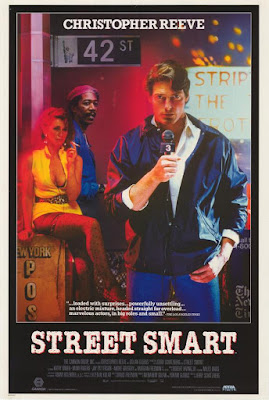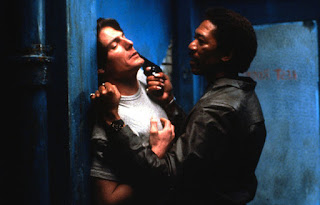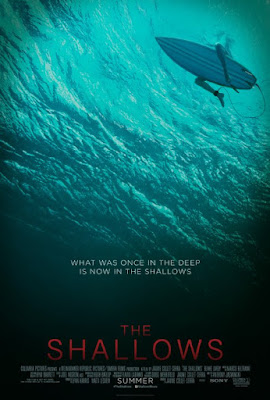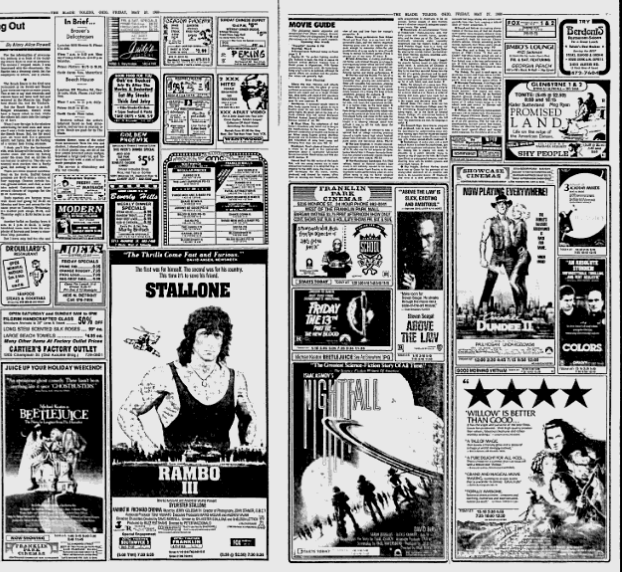RABID DOGS
(France/Canada - 2015; US release 2016)
Mario Bava's
RABID DOGS was shot in the summer of 1974 but went unseen for 23 years after being caught up in a bankruptcy quagmire involving producer Roberto Loyola. A departure for horror icon Bava, RABID DOGS (also seen in the inferior alternate cut KIDNAPPED, with scenes added two decades later by Bava's son Lamberto) was a crime thriller that crammed all of its characters into a getaway vehicle commandeered by a trio of robbers, with a hostage, and the carjacking victim who's trying to get his sick kid to a hospital. Now that the long-lost RABID DOGS has been readily available in the home video age (unfortunately, only the KIDNAPPED cut is currently on Blu-ray in the US), fans of Bava and Eurocrime have had a chance to see one of the director's strongest efforts from the latter days of his career. Directed and co-written by Eric Hannezo (THE HORDE director Yannick Dahan also co-wrote, and Oscar-winning ARTIST star Jean Dujardin is one of the producers), the remake of RABID DOGS follows the same basic concept but consistently displays a fundamental misunderstanding of what made Bava's film work so well. Sure, RABID DOGS '15 is a lot more flashy and stylish than Bava's minimalist thriller, but that only goes so far. Hannezo spends much more time on the robbery and the getaway, and makes some incidental changes: here, it's not a random flunky who gets killed, but the ringleader (Laurent Lucas), leaving his protege Sabri (Guillaume Gouix) in charge of two volatile hotheads, Vincent (Francois Arnaud) and Manu (Franck Gastambide). During a badly-staged shootout at a mall and a standoff in the underground parking garage, they take an innocent bystander (Virginie Ledoyen) hostage and eventually carjack a father (Lambert Wilson), who only has a few hours to get his gravely ill daughter to a hospital for a kidney transplant.
That's more or less how Bava's film starts, minus the remake's specificity of the child's illness and the gaudy visual flourishes. Bava got his characters in the car a lot quicker than Hannezo does, and unlike Bava, he can't wait to keep getting them
out of the car, never establishing the sweaty tension and increasing claustrophobia that makes RABID DOGS '74 so intense and nerve-wracking. No, Hannezo insists on giving us backstories of the bank robbers--who gives a shit that Manu is participating in the bank robbery to get enough money to get to see his estranged son? It doesn't humanize him at all, and it doesn't make him as dangerous as Aldo Caponi's comparable Bisturi in Bava's film. All we knew about the bad guys in Bava's film is that George Eastman's psychotic "32" had a huge dick. Hannezo's characters encounter various obstacles along the way, with a traffic jam of almost Godard/WEEKEND proportions slowing them down, and when they stop so the father can change a flat tire, the film completely falls apart. Even though the clock's ticking on the transplant, they take time to bullshit in the woods, share some smokes, and talk about themselves, as Hannezo cuts to a flashback of Vincent and Manu in some FIGHT CLUB-type activities in a garishly-lit red hallway seemingly on loan from Gaspar Noe. Later on, they get stuck in a WICKER MAN situation, with a town of gun-toting weirdos celebrating "The Feast of the Bear," which shuts the whole area down, preventing them from getting through or back out. The filmmakers do keep the devastating twist ending from the Bava film, but don't pull it off nearly as effectively. There's a few good moments that come mostly early on, though a later one, in the Bear town where an elderly, mute woman paralyzed by a stroke recognizes Manu from TV news reports and keeps incessantly ringing her little bell for help that never comes, is a memorable little set piece of which RABID DOGS '15 doesn't have nearly enough. There's some nice scenery in the Quebec location shooting (even though it takes place in France), but Hannezo is too focused on style over suspense here, as when he stops the climax cold for a slo-mo scene of everyone in the car bathed in more Gaspar Noe lighting schemes to the tune of Scala & Kolacny Brothers'
cover of Radiohead's "Creep," featured prominently in the trailer for THE SOCIAL NETWORK. Why? Who knows? Who cares? On one hand, it's nice to see an obscure Bava film getting props from a fan who must love the movie (there's even a music cue that recalls Stelvio Cipriani's score for the 1974 film), but on the other, if he loves it so much, it's too bad Hannezo didn't do better by it. Then again, revisiting Bava's RABID DOGS right before watching the remake probably didn't do it any favors.
(Unrated, 94 mins, also streaming on Netflix).GRIDLOCKED(Canada - 2016)
When you wade through enough DTV B-movie swill, you're bound to accidentally find a pleasant surprise every now and again. The NYC-set, Canadian-made GRIDLOCKED is an unabashed homage to the late '80s-to-mid '90s heyday of action producer Joel Silver, though the chief influence, according to director/co-writer Allan Ungar, was John Badham's
THE HARD WAY (1991), with James Woods as an angry cop forced to chaperone a spoiled movie star (Michael J. Fox) who's riding along with him to prep for an upcoming role. Ungar goes so far as to have HARD WAY villain Stephen Lang play the bad guy here, but the whole movie is an affectionate mash-up of Silver-produced classics like LETHAL WEAPON, DIE HARD, and THE LAST BOY SCOUT, with a big nod to John Carpenter's ASSAULT ON PRECINCT 13 to cap it off. When Canadian-born child actor-turned-Hollywood bad boy Brody Walker (Canadian karate champ Cody Hackman) has yet another public meltdown when he punches a cameraman for a TMZ-like tabloid show and gets the latest in a string of DUIs, his foul-mouthed agent Marty (Saul Rubinek, cast radically against type as "Saul Rubinek") tells him his next mega-budget, pre-packaged blockbuster will be canceled if he doesn't get his shit together. Brody's lawyer plea bargains a cushy deal for him: community service in the form a ride-along with a local cop. The cop turns out to be Hendrix (Dominic Purcell), a badass SWAT legend busted down to patrol duty after a botched raid that resulted in too many casualties. The stoical, humorless Hendrix isn't excited about the assignment and resists any attempt by Brody to bond, sighing in disgust as the pampered Hollywood brat takes selfies with perps and generally makes an ass of himself.
Wanting to visit his old pals, Hendrix takes Brody on a late-night tour of his old Strategic Response outpost and armory about 40 miles outside of Manhattan, where the staff includes elderly Sully on desk duty, running the check-in. That Sully is a) near retirement, and b) played by LETHAL WEAPON star
Danny Glover, it should come as no surprise that he ends up dead not long after declaring that he's gettin' too old for this shit. A dull and quiet night comes to an abrupt end when disgraced former SRT commander Korver (Lang) leads a team of mercenaries in an attempt to raid the facility, which the government has been using to covertly store assets seized both legally and illegally. Korver is after several hundred thousand dollars in bonds acquired from a raid involving a Central American drug lord, and he's not about to let his old buddy Hendrix stand in his way. Of course, the SWAT team on duty, plus Hendrix and Brody, have to work together--
if they don't kill each other first!--to survive the night and keep Korver's guys (Vinnie Jones among them, as a corrupt and improbably Cockney,
fookin''ell, mate!-accented NYC cop) from getting in. Purcell is an actor who has specialized in the unwatchable since PRISON BREAK went off the air, and relative to 98% of his headlining filmography, GRIDLOCKED is pretty damn good, right up there with his surprisingly solid boxing drama A FIGHTING MAN. He's perfectly cast and a great seething foil for the snotty Brody, who's obviously meant to be Justin Bieber several years from now (strangely, the film never makes use of Hackman's martial arts skills). GRIDLOCKED doesn't have an original thought in its head, but it wears its love of a specific era of action cinema on its sleeve and replicates it quite convincingly in a John Badham/Richard Donner/Walter Hill kind-of way, from the glossy production values to the smartass buddy action comedy bickering, and it's punctuated with some occasionally shocking, stomach-turning violence. Against all odds, this is definitely one of the better straight-to-DVD titles to come down the pike in quite a while, even if it's several years too late: had Purcell had this in theaters with some major studio backing right after PRISON BREAK ended, he would've never returned Uwe Boll's phone calls.
(R, 113 mins)
THE ABANDONED
(US - 2016)
![]()
Not to be confused with Nacho Cerda's 2006 Lucio Fulci homage with the same title, THE ABANDONED (shot in 2013 under the title THE CONFINES) is an intermittently effective chiller with some terrific atmosphere but it's saddled with a story derived from a hodgepodge of influences ranging from THE ORPHANAGE to SESSION 9 to CROPSEY to the jump-scares of Blumhouse to the facepalm-worthy twists of M. Night Shyamalan. Julia, aka "Streak" (Louisa Krause) is a troubled single mom in danger of losing her daughter if she screws up one more time. Her last chance is a gig as an overnight security guard at a posh, abandoned NYC apartment building. Her co-worker is bitter, wheelchair-bound Cooper (Jason Patric), who mans the control room and watches the monitors as Streak patrols the premises. They get off to a rocky start, with Cooper tired of breaking in newbies only to have them flake out after a week over the tedious nature of the job (though it could be that he's just an unpleasant asshole) and not even masking his contempt for Streak. She doesn't win him over by breaking the rules on her first night by letting a homeless man (Mark Margolis) and his dog stay in one of the rooms. It gets worse when she finds a bolted door blocking off a section of the building that Cooper claims was unfinished. Of course, Streak unlocks the door and finds that it leads to a series of dark, ominous underground tunnels branching off of the basement, along with the requisite checklist of things you find in dark, ominous underground tunnels, like hidden rooms with filthy mattresses, creepy childrens' drawings on the walls, and occasional taunting whispers and banging on doors. Of course, this used to be a secret orphanage from decades back, used to stash away deformed or mentally and physically challenged children of parents too poor to care for them or too embarrassed to acknowledge them at all, and of course, their vengeful spirits still haunt the premises. Or do they?
Making his feature directing debut, Eytan Rockaway has a good eye for chill-inducing atmosphere with his use of darkness, light, and shadows. But the script by Ido Fluk seems like the end result of a particularly wild weekend video roulette binge with his DVD collection. As messy as THE ABANDONED's story is, it's a film that's obviously trying hard. Maybe
too hard, as if its makers weren't confident they'd ever corral the cash to make another movie, so they're cramming everything they've got into this one. They had to be happy to get access to even a faded star like Patric, who helps the young filmmakers out by turning in a surprisingly strong performance and giving this low-budget affair what little commercial value he can (it still took three years to get released). The final twist packs a punch, but at the same time renders much of what's happened before meaningless. THE ABANDONED falls apart by the end, but it's not fair to bag on it too much--Rockaway and Fluk give it their best shot, and even when you're shaking your head as the plot collapses and the cliches abound, it
looks too good to just dismiss. He's not quite there yet, but if Rockaway can find a script that's up to par with his command of the camera and his staging of set pieces, he might go places.
(PG-13, 87 mins, also streaming on Netflix)

























































